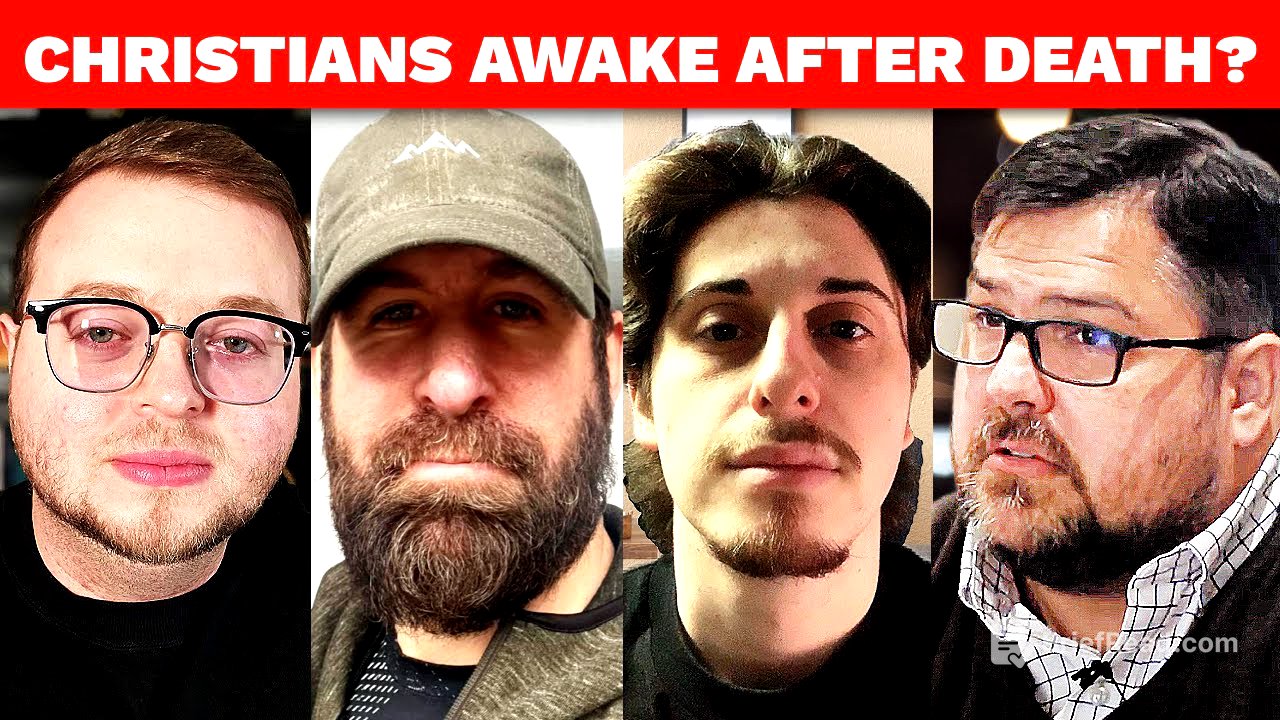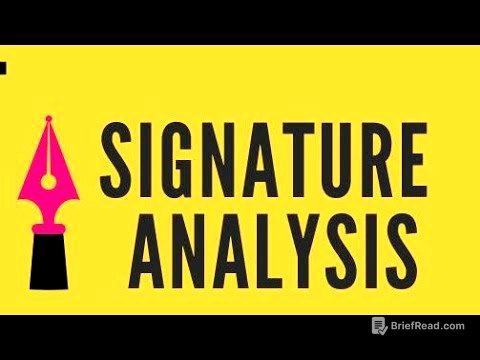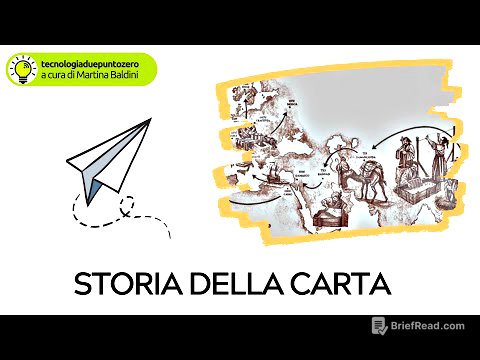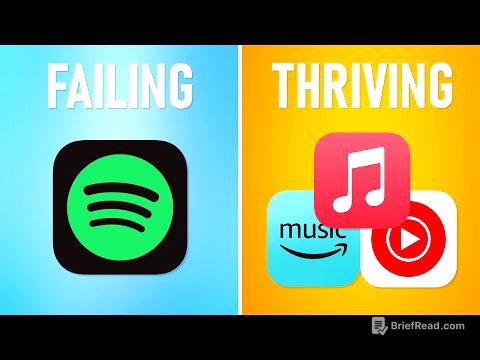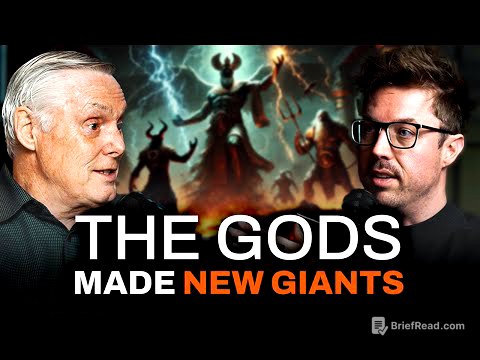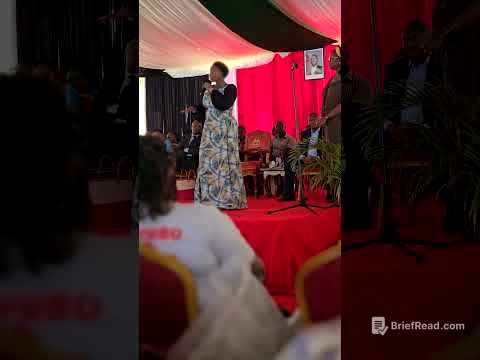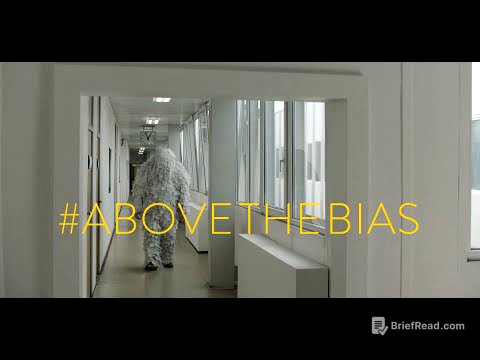TLDR;
This YouTube video from Trinity Radio features a debate on whether deceased human beings are conscious from death to resurrection, focusing on the intermediate state. The debaters, Chris Day and James Harding (negative), and Stephen Hafley and Nathan Boseman (affirmative), all affirm conditional immortality, leading to a brotherly yet rigorous discussion. The debate covers extra-biblical evidence, scriptural interpretations, and empirical data like near-death experiences.
- The affirmative team argues for a conscious intermediate state, supported by archaeological, literary, and empirical evidence.
- The negative team argues against consciousness after death, emphasizing scriptural interpretations and the simplicity of their view in harmonizing with biblical themes.
Introduction and Topic [2:01]
Braxton Hunter introduces a two-on-two debate on the consciousness of deceased human beings between death and resurrection, a topic of theological interest. All participants share a belief in conditional immortality, setting a foundation for a friendly yet rigorous discussion. The debaters have invested significant study and effort into preparing for this video.
Debaters' Introductions [3:22]
Chris Day expresses his pleasure and honor to participate in the debate, emphasizing the camaraderie among the debaters due to their shared minority view on hell. He directs viewers to his YouTube channel, "The Apologetics," and his website, chrisdate.info, for more information. James Harding, making his debate debut, expresses his excitement and gratitude for the opportunity. He mentions his small YouTube channel, "study is key," and his involvement with Chris Day's "rethinking hell" team. Stephen Hafley, who has published a book on the topic titled "Until Death Be Defeated" available on Amazon, and runs a YouTube channel called "Curious Kyros" focused on eschatology. Nathan Boseman, who runs a YouTube channel called "The Epitomy Ministries" focused on defending the reliability of the Gospels and the historicity of the resurrection, expresses his excitement to debate alongside his brothers and hopes the debate will serve as an example of brothers disagreeing but still recognizing their shared faith.
Debate Format [8:36]
The debate will consist of 15-minute opening statements from each team, 7.5-minute rebuttals, 20-minute cross-examinations, and 5-minute closings, followed by a Q&A session. Super chats will be privileged during the Q&A.
Affirmative Opening Statement [9:40]
Nathan Boseman and Stephen Hafley argue that both believers and unbelievers consciously await resurrection in Shaol after death. They support this claim with extra-biblical and biblical data, starting with the context of ancient Israelite beliefs. Archaeological evidence, such as objects buried with the dead, suggests a belief in using these items in the afterlife. Literary works like First Enoch and Fourth Ezra describe gathering places for the dead awaiting judgment, with different fates for the wicked and righteous, all presupposing consciousness. Early church fathers like Justin Martyr and Irenaeus also held to a conscious afterlife. The affirmative team challenges the negative to explain how the Bible could teach an unconscious intermediate state when historical and literary evidence suggests otherwise. They cite Flavius Josephus on the Pharisees' belief in a conscious afterlife in Shaol/Hades. Jesus's teachings, including the parable of the rich man and Lazarus, are presented as consistent with this view. The affirmative team argues that Jesus's silence on correcting the Pharisees' understanding implies agreement. They also reference Paul's description of paradise and Peter's comparison of the punishment of the ungodly to that of fallen angels, drawing parallels with descriptions in Enoch. The affirmative team concludes by presenting modern empirical data from near-death experiences (NDEs) and deathbed encounters, citing the case of a girl named Katie who had a detailed out-of-body experience while clinically dead, and a case reported by William Barrett of a woman named Doris who saw her deceased sister in a vision, unaware of her death. They argue that their exegesis aligns with historical context, didactic teachings, and modern observations, challenging the negative to account for all four lines of evidence.
Negative Opening Statement [24:29]
Chris Day and James Harding argue that deceased human beings are not conscious from death to resurrection, focusing on exegesis. They contend their view harmonizes more simply with biblical themes like judgment, justice, and resurrection. They cite Ecclesiastes 9, emphasizing the lack of mental activity in death and interpreting "forever" as the foreseeable future, allowing for resurrection. They reference 1 Corinthians 15, arguing that Paul suggests no life beyond death apart from resurrection and engages with Epicurean beliefs that consciousness ends with death. They also point out that Paul implies it makes no sense to pray for the dead or to live righteously if there is no resurrection. James Harding cites Psalm 6:4-5, where David appeals to God based on the fact that in death there is no remembrance of God, and Psalm 88:3-6 and 10-12, highlighting the psalmist's exhaustive terms for the realm of the dead, suggesting a holistic picture of the dead ceasing to praise or know God. He also references Isaiah 38:18-19, where Hezekiah states that Shaol cannot thank God, and Sarak, which states that from the dead, as from one who does not exist, thanksgiving has ceased. He concludes with Psalm 115:17, stating that the dead do not praise the Lord, nor do any who go down into silence, arguing that worshippers of false gods become like their idols, deprived of consciousness.
Affirmative Rebuttal [39:35]
Stephen Hafley argues that the negative team uses a backwards hermeneutic by interpreting Jesus and the apostles through the lens of Old Testament poetry and wisdom literature. He asserts that Jesus's teachings should be the primary lens through which the Old Testament is understood. He interprets Ecclesiastes 9:5 in the context of the teacher speaking, contrasting the righteous with the unrighteous, similar to Jesus in John 5:25 and Peter in 1 Peter 4:6. He argues that the righteous are described as living and the unrighteous as dead, even while alive, and that the unrighteous are described as not knowing anything. He states that Paul referenced Ecclesiastes 9:7 in 1 Corinthians 15:32 and didn't describe the unrighteous as being asleep and having no knowledge of God. He also states that in 1 Corinthians 15:34, Paul directly affirms that the passage is referring to the unrighteous. He concludes by stating that King David was writing from a position of being under God's wrath in Psalm 6:5 and that a person under God's wrath is going to go to the bad part of Shaol.
Negative Rebuttal [48:55]
James Harding argues that the prohibition against necromancy is similar to the prohibition against praying to idols, even though they have no real existence. He also states that NDEs do not provide better support for the affirmative's view because studies show that the majority of people who are resuscitated from clinical death have no recollection of any sort of conscious experience. He also states that there are different ways of interpreting Luke 23:43, the thief on the cross, and that it is more likely that Luke would have separated the verb and searon with hotti if his intention had been the same. Chris Day argues that the intertestamental Jewish culture was not monolithic on whether the dead are conscious or not and that there was a diversity of views in the ancient near east. He also states that First Enoch is apocalyptic symbolism and that there is no straightforward didactic teaching in the book that supports a conscious intermediate state. He also states that Josephus is a very questionable authority on the Pharisees and that it cannot be assumed that Jesus would have had any need to correct them when he's talking about Luke 16. He concludes by stating that the reason that Jesus's parables depict a realistic setting is so the scenes therein are familiar to his hearers and that this familiarity can be achieved by other means, such as by presenting hearers with a scene that they're familiar with, not from daily life, but from popular folk tales and tropes.
Affirmative Cross-Examination [57:32]
Nathan Boseman asks for an explanation of the majority of ancient Israel believing in a conscious afterlife. Chris Day responds that the affirmative is assuming a lot about what was the common view and that God revealed the truth about the afterlife to the ancient Israelites, even if the rest of their neighbors got it wrong. Nathan Boseman cites Ali Latipu's work on ancient Israel and the archaeological evidence of objects of use in graves, suggesting a belief in using them in the afterlife. James Harding counters with 1 Timothy 6:7, stating that we brought nothing into the world and we cannot take anything out of the world. Nathan Boseman responds that they weren't taking it out of the afterlife and that the belief was that they would enjoy it in the afterlife. James Harding states that it strikes him as very strange that scripture would affirm that it makes no sense to pray for the dead if they're not going to be raised but that it would be okay to light incense or to put bowls or swords at graves. Nathan Boseman asks about NDEs and the fact that the affirmative's view would expect zero NDEs. James Harding responds that there are different reasons why an NDE could occur and what could explain it. He also states that NDEs even if they show that a person who's considered clinically dead had a window of consciousness after when we thought they were dead, that doesn't tell you how long that consciousness lingers. Stephen Hafley asks about 1 Peter 3:18-20 and why Peter was affirming what Enoch said. Chris Day responds that Peter also refers to Tartarus and that Peter is using the Greek concept of Tarderus in which semi-divine beings are bound, you know, held for punishment.
Negative Cross-Examination [1:17:58]
Chris Day asks Stephen Hafley about Ecclesiastes 9 and the transition of meaning from verses 3 to 4. Stephen Hafley responds that it is poetic. Chris Day asks for evidence from the text of Ecclesiastes 9 that the author is going back and forth between physical and spiritual meanings repeatedly over the course of just a couple of verses. Stephen Hafley responds that it actually creates a contradiction within the context. Chris Day asks what the contradiction in the context is that the affirmative's reading opens up. Stephen Hafley responds that since this is an evil and all that is done under under the sun that the same event happens to all also the hearts of the children of man are full of evil. Chris Day asks if Stephen can give a quote from Paul in 1 Corinthians 15 or somewhere else where Ecclesiastes is interpreted as only applying to the wicked. Stephen Hafley responds that it is saying that those who don't have hope in the resurrection of the f of the of of being joined with with God for eternity. Chris Day asks if Stephen would agree that the forever language is not a good reason to reject the negative's reading of Ecclesiastes 9. Stephen Hafley responds yes. Chris Day asks if Stephen can point to anything in Luke 16 where Jesus calls the Pharisees says the Pharisees see beggars as dogs or see themselves as lions. Stephen Hafley responds that it's the it's how the the audience perceives themselves and how they perceive beggars. James Harding asks what the implied answer is to the question in Psalm 6:4-5, in Shaol who will give you praise. Stephen Hafley responds the righteous. James Harding asks if Stephen believes that at that time at the time that David was asking that question had he died he would have what would have happened to him had he died at that time. Stephen Hafley responds that he would have gone to the the pit so to speak like he he would have gone to down to torment where uh the rich man was to that's where God's wrath go and there would have been no praise. James Harding asks if Stephen affirms in his book that David did go to or would go to the land of silence or or that the righteous go to the land of silence. Stephen Hafley responds that the how he defines land of silence is it's like radio silent from this world.
Affirmative Closing Statement [1:40:40]
Nathan Boseman thanks Braxton Hunter and Trinity Radio for hosting the debate and thanks James and Chris for agreeing to do the debate. He states that he and Steve argued that the intermediate state is consciously experienced and that they brought forth a cumulative argument that contains four parts: the extra biblical literary evidence, the exogetical case, archaeological evidence, and an empirical analysis. He states that he provided what he thinks is a good explanation for the NDEs and that their view would be hardpressed to find even one example of a near-death experience that is veritical. Stephen Hafley states that Chris would consider First Enoch teaching something that's that was literal if it was ever taught to be literal and that that's exactly what Peter and Jude do. He also states that he believes that Peter in 1st Peter 3:18-20 is referring the same same group as 2 Peter 2 4 which is the fallen angels and that's how it was interpreted by by every single antiene father that we we have the writings of that uh topic.
Negative Closing Statement [1:46:47]
Chris Day thanks Nathan and Stephen for being charitable, friendly, and astute interlocutors. He criticizes the affirmative for claiming that James and he are interpreting the New Testament through the lens of the Old Testament. He states that the very second text in their opening was 1 Corinthians 15 and that their entire case from 1 Corinthians 15 was completely neglected by their opponents in every imaginable way. He also states that they did in fact offer plausible explanations for some of the extra biblical evidence that was raised. He concludes by stating that both sides have said an awful lot of presented an awful lot of evidence and that they've had very little time to respond to it.
Q&A: 1 Samuel 28:15 [1:52:10]
The negative team addresses 1 Samuel 28:15, the witch of Endor, stating that whether Samuel was conscious or unconscious before being invoked is never mentioned. They state that even if it is the real Samuel, nothing says that he was conscious prior to the seance and that he could have been brought back to a conscious state through the seance. They also state that it's not even clear that if it is the real Samuel, it's not even clear that Samuel is a disembodied soul at this point and that he's coming up out of the ground wearing clothes. The affirmative team responds that in the Hebrew in verse 13, the woman says she saw an Elohim which can refer to the spiritual beings whether it's angels whether it's disembodied souls whatever. They also state that it goes back to the how Jesus rebuke of the Sadducees and that if God is powerful enough to clothe disembodied souls, is is he powerful enough to to make it so once we die, we're able to retain some kind of identity and for others to be able to acknow visually see that identity.
Q&A: Acts 2 and David's Grave [1:56:48]
The affirmative team responds to the question of why Peter and Paul say David is decomposing in his grave in Acts 2 by stating that it's a reference to the body of David and that Jesus's grave is no longer with us because he has already resurrected and he is the first fruits of resurrection. The negative team responds that the text explicitly says that David was buried, not David's body. They also state that in Mark 15:46, Joseph of Arimathea wraps Jesus in the linen shroud and lays Jesus in a tomb, not his body. The affirmative team responds that even people who believe in a disembodied existence right now would still use that phraseiology. The negative team responds that the people that the affirmative team is talking about are people who have inherited belief in disembodied souls from almost 2,000 years of church tradition and that the real question is whether first century Jews might have spoken so inconsistently um if they believed in a conscious intermediate state.
Q&A: Dead in Christ [2:00:36]
The negative team responds to the question of what the Bible means when it says dead in Christ by stating that it's simply someone who's physically dead but with Christ. They also state that it just means those who died joined to Christ and that by virtue of being united to him in faith, we are in him.
Q&A: Nobody Ascended to Heaven [2:01:34]
The affirmative team responds to the question of why Jesus says, "Nobody has ascended to heaven and where I am going, you cannot come" by stating that because he ascended to heaven and the dead descend to shale or Hades.
Q&A: Psyche and Nephesh [2:02:19]
The affirmative team responds to the question of why the New Testament authors use the word psyche like the Old Testament use of nephesh which is a physical body si similar to Aristotle or Epicurus and unlike Plato by stating that in Job 14 20-22, Job describes an ungodly person after they had died feeling pain in their body and that he only feels he only uh what's the word um thinks of himself or something and that word is nephesh. The negative team responds that the passage isn't saying that the dead are embodied and in pain while unaware of what their children experience on earth and that it's saying that men only feel the pain of their own body as they grow old, get sick, or pass away.
Q&A: Jesus and Spirits in Prison [2:05:14]
The negative team responds to the question of if Jesus spoke to the spirits in prison, then doesn't that mean Jesus was conscious in death by stating that the text does not say that Jesus spoke to the to deceased uh you know disembodied human spirits in Hades. They also state that there are multiple ways of understanding this text that don't in any way, shape, or form involve disembodied human souls experiencing anything consciously. The affirmative team responds that Jesus he descends into Hades and preaches and so we think that's an entailment of consciousness in the afterlife. The negative team responds that they did not say preach, they said proclaim and that Jesus is like proclaiming or pronouncing victory to the unclean spirits.
Q&A: Jesus in Shaol or Heaven [2:08:41]
The negative team responds to the question of is Jesus in shel or heaven now by stating that he's in heaven at the right hand of the father. They also state that Jesus is not in heaven right now as a disembodied soul and that he's in heaven as a physically embodied, immortal, resurrected person.
Q&A: Basis for Paradise [2:09:35]
The affirmative team responds to the question of is there any basis other than the thief on the cross to conclude that paradise refers to the realm of the righteous dead in shale by stating that you also have 2 Corinthians 12:2 to4. They also state that in Revelation 2:7, the tree of life is in paradise and that Revelation 22 later on goes on to present the tree of life as something to which we'll have access after the resurrection, suggesting that paradise awaits us only at the or after the resurrection. The negative team responds that Stephen is making a lot out of the expression out of the body and that Jewish literature records at least two examples of at least two kinds of journeys as it were to the supernatural world.
Q&A: Mount of Transfiguration [2:13:25]
The negative team responds to the question of what about the Mount of Transfiguration and Matthew 22 by stating that as far as God of the living, we can know for certain with absolute certainty that Jesus is not in fact saying that the patriarchs are in some kind in some way alive. They also state that it's very plausible that the experience the disciples had of seeing Elijah and Moses on the mountaintop with Jesus, he they're not seeing the disembodied souls of Elijah and Moses and that they're being shown a vision um in their in their mind's eye. The affirmative team responds that their argument was essentially they didn't argue from the transfiguration and that they did argue from this notion of I am the God of the living and the dead.
